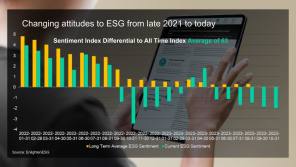For example, last year the UK’s largest pension scheme, the Universities Superannuation Scheme, announced that by 2023 it would completely divest from companies involved in tobacco manufacturing, coal mining and weapons manufacturers – currently such investments make up more than 25 per cent of their revenues.
Profitability
Such actions highlight that more and more pension schemes are recognising that they must place sustainability over immediate profit if they are to remain competitive in the current market.
Better yet, the commitment of major pension schemes to eradicate such a profitable investment strategy suggests that there are certainly gains to be made by pursuing ESG initiatives.
Indeed, trends indicate that ESG-tailored funds are outperforming their non-ESG counterparts. Given the popularity of many ESG-aligned companies, profit performance among such organisations tends to be strong. And naturally, higher fund levels will result in a stronger retirement outcome for clients.
Certainly, this is a promising start for pension schemes. Not only does it suggest that there is a strong appetite amongst funds to adopt an ESG-driven strategy, but it also suggests that they need not sacrifice profitability in favour of sustainability.

Every client has a unique set of preferences, which can make it admittedly tricky to develop a strategy.
That said, it is important for advisers to consider the entire strategy of a pension scheme, fund or investment. After all, some schemes tend to focus solely on the environmental aspect of ESG. Of course, environmental focus is vital, particularly given the current environmental crisis, but advisers should be sure to explore the social credentials.
With this in mind, advisers should go to extra lengths to ensure that funds, investments and schemes incorporate the entirety of ESG. For example, advisers should consider the impact scheme investments have on society in general – they may exclusively invest in sustainable energy.
Organisations’ internal labour standards should also be considered if they are to truly adopt an ESG strategy. For example, ensuring that the company in question champions diversity and provides equal opportunities for all employees. In doing so, advisers will enable their clients to build a well-rounded retirement strategy that supports ESG.
Of course, with more and more schemes and investments actively pursuing ESG-tailored investment strategies, one would assume that advisers would be spoiled for choice.
However, every client has a unique set of preferences, which can make it admittedly tricky to develop a strategy that meets their specific requirements.
A tailored approach
It is understandable, and indeed expected, that clients have strong opinions about which investments are the most important to them – for example, some clients may be adamantly opposed to investing in companies that are involved in tobacco or the arms industry – and having such specific requirements can prove problematic if an adviser thoroughly researches one of their funds and discovers that the fund invests in something they disagree with.
As such, advisers must ensure that comprehensive research is conducted to ensure that each fund or investment suits their clients' principles. Doing such research will prevent oversights and ensure that clients are able to maintain their ESG principles while remaining profitable.

It is important to acknowledge that ESG preferences are still relatively new terrain.











